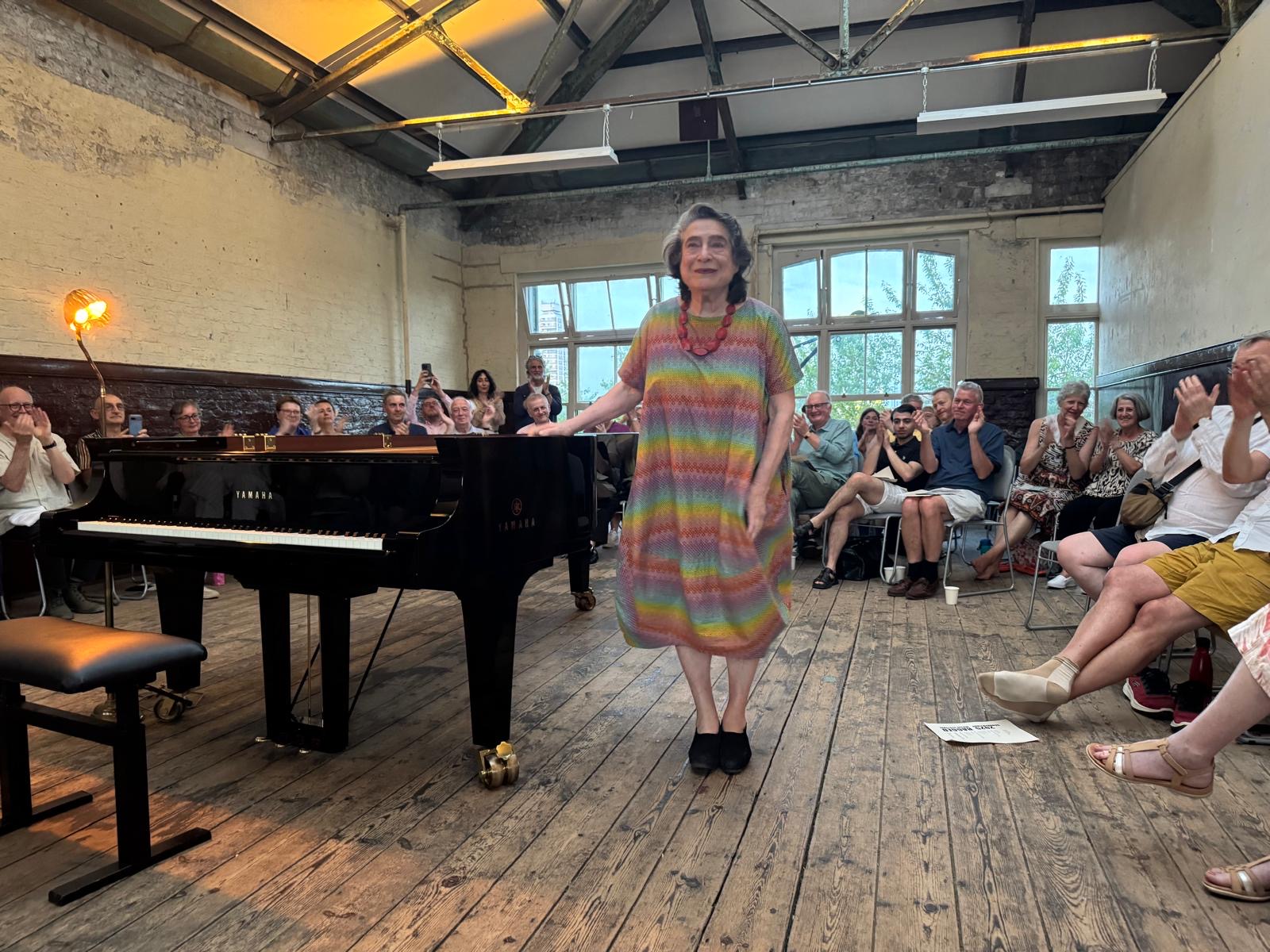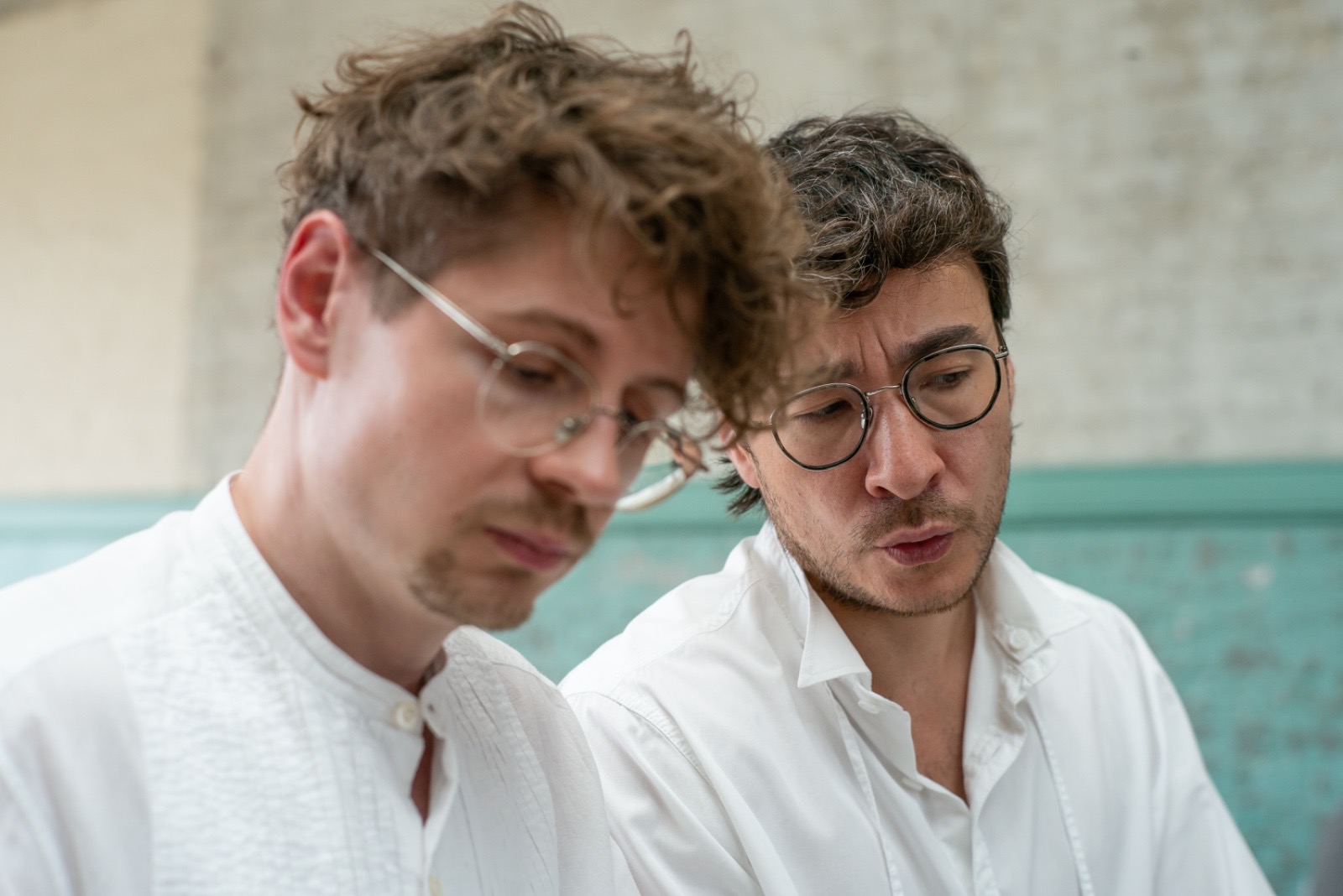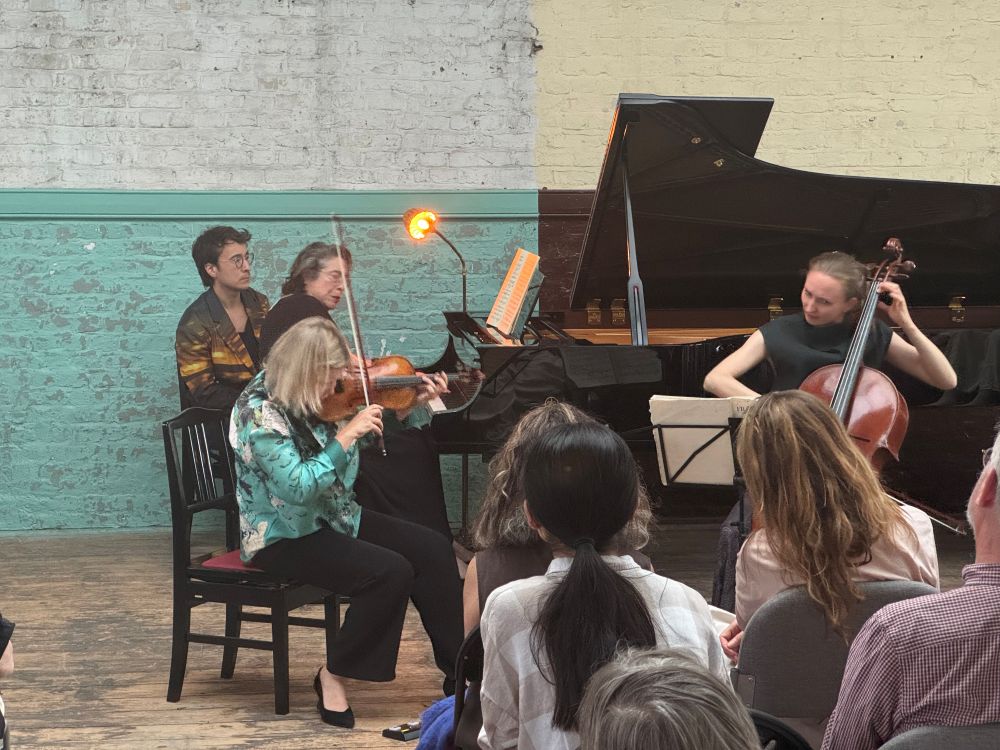Schubertiade 3 at the Ragged Music Festival, Mile End review - five great musicians keep spirits soaring | reviews, news & interviews
Schubertiade 3 at the Ragged Music Festival, Mile End review - five great musicians keep spirits soaring
Schubertiade 3 at the Ragged Music Festival, Mile End review - five great musicians keep spirits soaring
Kolesnikov, Tsoy, Leonskaja, Ibragimova and Hecker in spellbinding performances
Aldeburgh offered strong competition for the three evenings of Schubert at the discreetly restored Ragged School Museum, but I knew I had to return for the last event of Pavel Kolesnikov and Samson Tsoy’s third festival here, much as I’d love to have heard Allan Clayton in Britten’s Our Hunting Fathers. And if anything, the three-part all-Schubert programme was even more levitational than I’d expected.
The circumstances are unique. Kolesnikov and Tsoy welcome you as if into their home to sit in a close semi-circle for wonders in the schoolroom at the top of the building – now more spacious, with big windows at both ends, since the partition has been removed. The Yamaha piano has been hauled up, as before, Amsterdam-style, entering by the streetside window, to be tended lovingly over the three days by technician Yusuke Kojima. And here you witness the greatest playing of Schubert in the world. If that sounds like an exaggeration, you should have been there for the centrepiece: Elisabeth Leonskaja (pictured below on a previous evening), friend and mentor of the two younger partner-pianists and due to celebrate her 80th birthday in November, playing from memory the A minor Sonata, D845. 
Throughout the evening, one marvelled at Schubert’s sleights of hand at the end of one section and the beginning of the next – here, in the extended exposition treatment of the main idea which made the repeat all the more essential (Brendel and his pupils never gave them, which is why I can only respect the late master, not love him). The ever-surprising round-offs gave extra life to the sheer charm of the B flat Sonata for four hands at one piano with which Kolesnikov and Tsoy (pictured below on the first evening) began the concert; I disagree with the caveat of a friend, who thought this one of the most remarkable concerts she’d ever attended but questioned whether the starter made it too long. 
The levitation reached an apogee of sorts in the B flat major Piano Trio, Ibragimova and Leonskaja joined here for the first time by cellist Marie-Elisabeth Hecker (pictured below on the right with Leonskaja and Ibragimova, Tsoy as page-turner). Having never heard her before, I’d just been bowled over by the two-CD set of mostly Russian works for cello and piano she’s recorded with husband Martin Helmchen, which BBC Music Magazine has just made its release of the month. Hers is music-making on a no-fuss, transcendental level; again, an exposition repeat was longed for so we could hear the unique way she launched into a counter-theme.  Ibragimova produced exquisite pianissimi and though Leonskaja’s role here was most often poised support, the melodic descents against shimmering strings provided another magical moment in an evening stocked full of them. And do visit the Museum – I can vouch for the surprise of the café into which I stepped from the canal, now run by Tangerine Dream, whose forced departure from the Chelsea Physic Garden made me give up my membership. Happily they're now to be found in Chelsea, South Kensington and Mile End.
Ibragimova produced exquisite pianissimi and though Leonskaja’s role here was most often poised support, the melodic descents against shimmering strings provided another magical moment in an evening stocked full of them. And do visit the Museum – I can vouch for the surprise of the café into which I stepped from the canal, now run by Tangerine Dream, whose forced departure from the Chelsea Physic Garden made me give up my membership. Happily they're now to be found in Chelsea, South Kensington and Mile End.
The future of Arts Journalism
You can stop theartsdesk.com closing!
We urgently need financing to survive. Our fundraising drive has thus far raised £49,000 but we need to reach £100,000 or we will be forced to close. Please contribute here: https://gofund.me/c3f6033d
And if you can forward this information to anyone who might assist, we’d be grateful.

Subscribe to theartsdesk.com
Thank you for continuing to read our work on theartsdesk.com. For unlimited access to every article in its entirety, including our archive of more than 15,000 pieces, we're asking for £5 per month or £40 per year. We feel it's a very good deal, and hope you do too.
To take a subscription now simply click here.
And if you're looking for that extra gift for a friend or family member, why not treat them to a theartsdesk.com gift subscription?
more Classical music
 BBC Proms: Akhmetshina, LPO, Gardner review - liquid luxuries
First-class service on an ocean-going programme
BBC Proms: Akhmetshina, LPO, Gardner review - liquid luxuries
First-class service on an ocean-going programme
 Budapest Festival Orchestra, Iván Fischer, Edinburgh International Festival 2025 review - mania and menuets
The Hungarians bring dance music to Edinburgh, but Fischer’s pastiche falls flat
Budapest Festival Orchestra, Iván Fischer, Edinburgh International Festival 2025 review - mania and menuets
The Hungarians bring dance music to Edinburgh, but Fischer’s pastiche falls flat
 Classical CDs: Hamlet, harps and haiku
Epic romantic symphonies, unaccompanied choral music and a bold string quartet's response to rising sea levels
Classical CDs: Hamlet, harps and haiku
Epic romantic symphonies, unaccompanied choral music and a bold string quartet's response to rising sea levels
 Kolesnikov, Tsoy / Liu, NCPA Orchestra, Chung, Edinburgh International Festival 2025 review - transfigured playing and heavenly desire
Three star pianists work wonders, and an orchestra dazzles, at least on the surface
Kolesnikov, Tsoy / Liu, NCPA Orchestra, Chung, Edinburgh International Festival 2025 review - transfigured playing and heavenly desire
Three star pianists work wonders, and an orchestra dazzles, at least on the surface
 BBC Proms: Láng, Cser, Budapest Festival Orchestra, Iván Fischer review - idiomatic inflections
Bartók’s heart of darkness follows Beethoven’s dancing light
BBC Proms: Láng, Cser, Budapest Festival Orchestra, Iván Fischer review - idiomatic inflections
Bartók’s heart of darkness follows Beethoven’s dancing light
 Weilerstein, NYO2, Payare / Dueñas, Malofeev, Edinburgh International Festival 2025 review - youthful energy and emotional intensity
Big-boned Prokofiev and Shostakovich, cacophonous López, plus intense violin/piano duo
Weilerstein, NYO2, Payare / Dueñas, Malofeev, Edinburgh International Festival 2025 review - youthful energy and emotional intensity
Big-boned Prokofiev and Shostakovich, cacophonous López, plus intense violin/piano duo
 theartsdesk at the Three Choirs Festival - Passion in the Cathedral
Cantatas new and old, slate quarries to Calvary
theartsdesk at the Three Choirs Festival - Passion in the Cathedral
Cantatas new and old, slate quarries to Calvary
 BBC Proms: Estonian Philharmonic Chamber Choir, Kaljuste review - Arvo Pärt 90th birthday tribute
Stillness and contemplation characterise this well sung late-nighter
BBC Proms: Estonian Philharmonic Chamber Choir, Kaljuste review - Arvo Pärt 90th birthday tribute
Stillness and contemplation characterise this well sung late-nighter
 BBC Proms: Kholodenko, BBCNOW, Otaka review - exhilarating Lutosławski, underwhelming Rachmaninov
Polish composers to the fore in veteran conductor’s farewell
BBC Proms: Kholodenko, BBCNOW, Otaka review - exhilarating Lutosławski, underwhelming Rachmaninov
Polish composers to the fore in veteran conductor’s farewell
 theartsdesk at the Pärnu Music Festival 2025 - Arvo Pärt at 90 flanked by lightness and warmth
Paavo Järvi’s Estonian Festival Orchestra still casts its familiar spell
theartsdesk at the Pärnu Music Festival 2025 - Arvo Pärt at 90 flanked by lightness and warmth
Paavo Järvi’s Estonian Festival Orchestra still casts its familiar spell
 BBC Proms: Batsashvili, BBC Scottish Symphony Orchestra, Ryan Wigglesworth review - grief and glory
Subdued Mozart yields to blazing Bruckner
BBC Proms: Batsashvili, BBC Scottish Symphony Orchestra, Ryan Wigglesworth review - grief and glory
Subdued Mozart yields to blazing Bruckner

Add comment